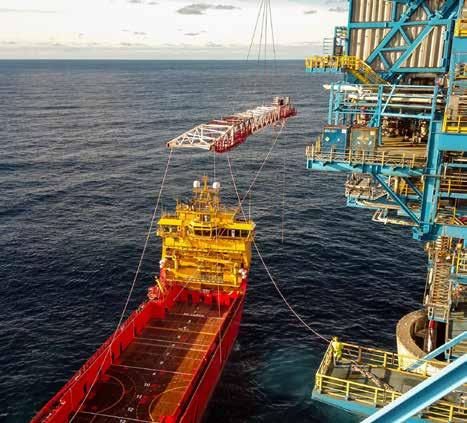
9 minute read
Operations in the Black Sea
Edda Flora, carrying 23 Østensjø crew and 28 DeepOcean crew, manoeuvred into geopolitically controversial waters in the early summer, when tasked with inspecting the newly laid gas pipeline TurkStream in the Black Sea.
BY TERJE EMIL JOHANNESSEN
Advertisement
Arriving in Russian waters, captain Ole Kjørlien had to handle a complicated political landscape. In spite of extensive preparations to ensure the shipping company kept abreast of a tangle of regulations, small, almost insignificant deviations led to him being fined.
THE SHIP HAD TO BE IMPORTED
If you are doing work within the 12-mile limit in Russia, they have to «import» the vessel. This rule actually applies in many nations, like Brazil, USA, Mexico and Australia, as a way of protecting domestic jobs. For ships working within these national borders, extensive preparations and delivery of detailed technical documentation on the vessel is necessary. Captain Ole Kjørlien had more than 500 double-paged documents ready for inspection, with every required original signature and official stamp.
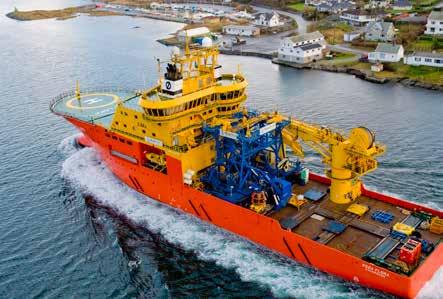
DIFFERENT LISTS
- When approaching Russia, we were contacted by two agents who gave us a long list of every formality we had to observe. This new list contained completely new demands to what we needed to provide. We had to act quickly to complete the documentation before being allowed into the port of Novorossijsk. It’s from there that the two pipelines we were inspecting are managed, he says, and continues: - One of the agents representing the Russian oil company that co-owns the pipeline was not available when we arrived. So we were turned over to a different agent, who created a chaotic situation by giving us yet another list of demands, different from the first.
FORCED TO CHANGE COURSE
- The plan was for us to first arrive at a holiday destination, the town of Anapa, while waiting to be allowed into Novorossijsk. The night before arrival, the bridge was a flurry of activity. These waters have a lot of forbidden military zones. We had thoroughly planned our route to the anchorage at 9 o-clock. I started work early that morning and was promptly on the bridge. That’s when we were suddenly radioed with orders to change course. I asked who was giving the order, but the person was hard to understand. He spoke fairly sternly, repeating «turn starboard!» «I’m not going to turn starboard before you tell me who you Authorities arrive onboad on arrival
Edda Flora heading for the Black Sea are,» I replied. He repeated his order to turn starboard, but again I refused before he’d identified himself. Eventually he relented, replying: «Russian Coast Guard.» We made the turn, but I informed him that our ship would then cross a line we had been told not to cross. We then sailed into the port of Anapa, but as we were getting ready to drop anchor, we noticed the waters getting shallower and shallower. During that night, we discovered a message from the Russians that we were not to drop anchor outside the designated are, because they had laid mines. We ended up not dropping anchor, instead I decided to put us on DP, he says. The story continues:
ODOROUS DISINFECTION
A little later, a big tug with 15-20 people on board came up alongside. Two of the crew were dressed in disinfectant equipment and gas masks, carrying a lot of barrels and pumps. They were going to disinfect the entire ship. - Because of Covid, we’d set up a large table in the hangar for our guests, because we didn’t want them going into the crew cabins or among the technical installations. But it was of no use. The disinfectant crew immediately asked for blueprints of the ship, which we gave them. The liquid smelled awful, he says, making a grimace to state his point.
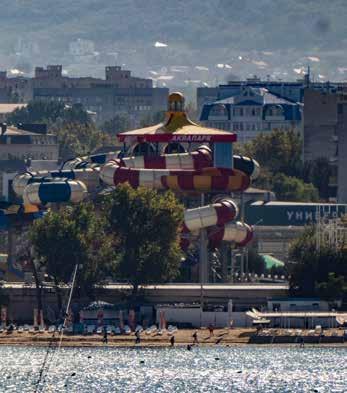
Waiting for vessel clearance in Russia
FINED
The whole thing was chaotic. They tried to organise the crowd to please everyone. There were representatives from what they called the «Quarantine Agency», a doctor from the port administration, port authority, a group of customs agents and four FSB-officers, three of whom wore uniforms. - While trying to organise the situation, a uniformed officer approached me and said, «Big problem.» I asked our two Russian interpreters from DeepOcean to ask what the problem was. The answer was that we’d crossed a line we weren’t supposed to cross on our approach to the port. This was a serious accusation. We sent them up to the bridge to talk to them, while ordering all our crew onto the stern deck. Nobody could remain inside during disinfection.
PHOTOGRAPHED EVERYTHING
The customs agents quickly got going with their inspection of the ship, while 2-3 people went around photographing everything from the engine room to the tallest mast, paying extra attention to technical equipment, cranes, containers, the control room, the engine room, the serial number on every engine and thruster and so on. They were accompanied by the Chief Engineer. - I just shook my head before heading to the bridge to speak to the curt Russian officers. It felt like an interrogation. I brought them over to the map machine, showing them the route we followed on approach to Anapa. They could see all our manoeuvres and at which time they were made. I also informed them about the order given us by the coast guard. They paid no attention to it. They produced a map showing us a different nogo zone that none of us were familiar with. He repeated: «Big problem, captain!», adding that we would be fined. I replied that in that case, I’d like to know what we were being fined for, while telling my people on the bridge to go through every map and message on the Navtex (which delivers maritime security briefings to ships), that we had received and followed. Then it was discovered that one hour before we’d arrived in the «strict zone», at 3 o’clock at night, a message had been received which we had overlooked. Ordinarily, we’d also be informed on the radio that we were approaching a dangerous zone. But that message never came. So I told them I found their conclusion very strange. The Russian officers continued talking loudly and brusquely, which might be normal Russian behaviour when explaining something,
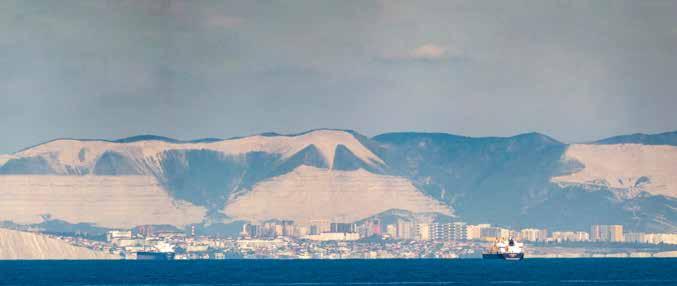
JAMMED
Edda Flora lay outside Anapa for two days for additional document review before the ship was cleared to continue to the pipeline inspection starting coordinates. - Radar stations dotted the coastline, and we passed a large naval base. We were being watched, nautical mile by nautical mile. The coast guard hailed us continually to correct our course by a few degrees. When we began the inspection, we discovered that parts of our electronic equipment had been knocked out. They simply jammed us.
WESTWARD INTO LOWER PRESSURE
Leaving Russian waters, bombing and war was taking place on land to their south-southeast. The conflict between Armenia and Aserbajdsjan over the Nagorno-Karabakh region was in full force. To the north, tension was still high between the Ukraine and the Russian separatists in Crimea and the lands to the north. Nautical mile by nautical mile, the crew onboard Edda Flora lay the turmoil in their wake. Captain Ole Kjørlien finally felt the pressure receding.

Edda Flora finished its inspection of the TurkStream in midNovember. By then, Kjørlien had been back home in Haugesund for long enough to be ready for service again. Assignments in the Mediterranean waited for him.
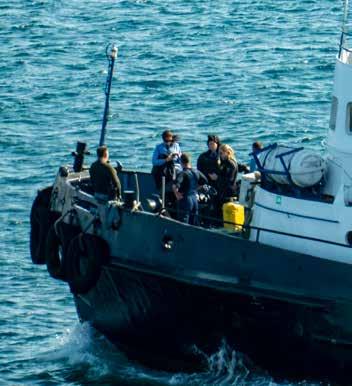
SIDEBAR
- TurkStream is the project for a gas pipeline stretching across the Black Sea from Russia to Turkey and Europe, comprising of two parallel lines. Each line has a throughput capacity of 15.75 billion cubic meters of gas per year. - Commercial gas supply through the gas pipeline started on January 1st 2020. On January 8th, Russian president Vladimir Putin and Turkish president Recep Tayyip Erdogan officially launched TurkStream at an opening ceremony in Istanbul.
OPERASJONER I SVARTEHAVET
Edda Flora med 23 Østensjø-mannskap og 28 operatører og tolker fra DeepOcean om bord måtte på forsommeren i år manøvrere seg inn i et kontroversielt politisk farvann da de skulle gjøre en inspeksjons jobb på den nylagte gassledningen TurkStream over Svartehavet. Ved ankomsten i russisk farvann måtte kaptein Ole Kjørlien takle et bryskt byråkrati. Små avvik førte til at han ble bøtelagt. For skip som skal jobbe innenfor de russiske nasjonale grensene, krever et midlertidig eierskifte. Kaptein Ole Kjørlien hadde en god bunke dokumenter klar for gjennomgang, alle med nødvendige originale underskrifter og offisielle stempler. Rett før ankomst i Russland, måtte de i all hast kaste om og komplettere dokumentasjonen før de fikk lov til å dra inn til havnebyen Novorossijsk via Anapa. - Natta før vi skulle inn, ble det hektisk på brua. Farvannet hadde en rekke forbudte militære soner. Vi hadde nøye planlagt ruten dit fram til ankringsplass kl 09. Jeg tørnet ut til frokost og gikk opp på brua for eventuelt litt støtte for vakthavende offiser. Da ble vi kalt opp på radioen med ordre om at vi måtte endre kursen. Jeg spurte om hvem som ga denne ordren, men det var vanskelig å forstå vedkommende. Han var temmelig brysk og gjentok «Turn starboard!». Local tug arriving with authorities - I’m not going to turn starboard before you are telling me who you are, svarte jeg. Vedkommende i andre enden av telefonen gjentok ordren om ny kurs, men jeg nektet å utføre denne manøveren før han identifiserte seg selv. Til slutt svarte han «Russian Coast Guard». Da svinge vi selvsagt av, men jeg ga samtidig beskjed om at skipet da kom til å krysse ei grense vi hadde fått klar beskjed om ikke å passere, forteller han.
SAMMENDRAG
Ei stund seinere ankom en svær taubåt med 15-20 mann om bord. To av dem var ikledd helt spesielle beskyttelsesklær med gassmaske over hodet og hadde med seg en rekke grønne kanner og pumpeutstyr. De skulle desinfisere hele båten innvendig. - Mens de prøvde å organisere dette, kom en offiser iført svart uniform fram til meg og sa «Big problem, Captain». Jeg spurte de to russiske tolkene som var med i DeepOcean-staben om de han kunne spørre ham om hva som var problemet. Svaret var at vi hadde krysset ei grense på vår innseiling til havnen. Dette var en alvorlig anklage.
- Vi sendte dem opp på brua for nærmere samtale og samtidig kommanderte vi hele mannskapet ut på bakdekket. Ingen kunne være inne når desinfiseringen skulle skje.









